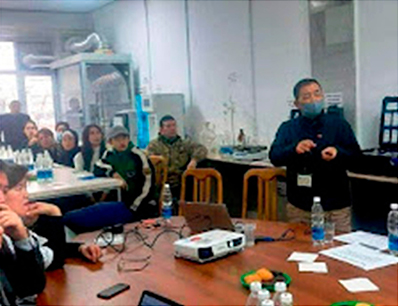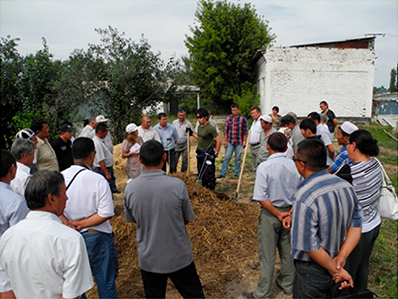MASTER TECHNIQUES from Japan to the World 3
Contributing to Agriculture Promotion with Japan’s Technical Guidance on Organic Fertilizers
—Disseminating and Establishing Agricultural Techniques through the Soil and Crop Analysis Center of Kyrgyz National Agrarian University—

Dr. Nishizaki providing a lecture to leaders in organic farming at the Soil and Crop Analysis Center in Kyrgyz National Agrarian University

Providing technical assistance to local farmers on making organic fertilizers
The Kyrgyz Republic became an independent country in 1991 following the collapse of the Soviet Union. Agriculture is one of the main industries in the country, but after independence, the destruction of collective farming and the degradation of administrative functions led to the discontinuance of technical assistance and the distribution of agricultural resources such as chemical fertilizer to farmers. While the country had to depend on expensive and unstable imported chemical fertilizers because they were not manufactured domestically, farmers had a hard time purchasing a sufficient amount. As a result, declines in technical expertise and soil fertility lowered crop yield and quality, and consequently, the income of farmers who constitute around 60% of the population.
Biomass research co., ltd. (Bird) plays a role in improving this situation. Bird started as a venture company which was supported by Obihiro University of Agriculture and Veterinary Medicine in Hokkaido, Japan, and works on biogas plant projects leveraging the university’s research outcomes. Since 2013, Bird has been working on a JICA Partnership Program to promote organic farming by providing technical assistance for producing organic fertilizers in the Kyrgyz Republic. In February 2022, “Human Resources Development Project for Soil and Crop Analysis Technology at Kyrgyz National Agrarian University” started for a planned period of three and half years, aiming to establish and disseminate organic farming techniques in the Kyrgyz Republic.
Dr. NISHIZAKI Kunio, an executive officer of Bird, who has been working on various projects in the Kyrgyz Republic for a long time, explains that “We started this project to leverage Japan’s techniques so that we could develop organic fertilizers using livestock waste readily available to farmers and promote their usage. This approach was welcomed by farmers since other fertilizers were expensive and unaffordable, while these fertilizers can be produced from discarded livestock waste. Using these organic fertilizers in infertile land doubled harvests. As harvests visibly grew, farmers almost started fighting to get the organic fertilizer. This experience made me recognize that using organic fertilizers would help promote agriculture in the country. The Kyrgyz Republic and Hokkaido have many similarities such as climate and industries, so I feel familiarity with the country. I continue to cooperate with people in Kyrgyz, with a hope to help struggling farmers as well as to promote the country’s agriculture.”
Many seminars on organic fertilizers were held through such cooperation. Many farmers have started organic farming, since organic fertilizers are environment-friendly and cost-effective and help improve the quality and quantity of crops as well as the income of farmers. In recognition of his contribution to the development of organic farming in the Kyrgyz Republic, Dr. Nishizaki received the title of professor emeritus from Kyrgyz National Agrarian University in 2016.
In 2019, the Kyrgyz Republic enacted a law about organic agricultural production and established a policy of promoting organic farming across the country. “Techniques that accurately analyze soil conditions and enable good harvest with a minimum amount of fertilizer should be established in the Kyrgyz Republic in order to further develop organic farming in the country. We currently help the country establish soil and crop analysis techniques that are crucial for this purpose, organize manuals and documents that are important tools for sharing these techniques, and develop leaders who disseminate them to farmers,” says Dr. Nishizaki. As crops from organic farming have added value, the project plans to support selling them in new markets including through exports. Organic farming garners a lot of expectations as a technique that helps the growth of the Kyrgyz economy.
<< Previous Page Next Page >>
Main Text | Reference Statistics | Appendix | Stories from the Field | Master Techniques from Japan to the World | ODA Topics
